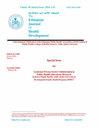独立中的哈萨克斯坦医疗体系:主要阶段及其发展前景
IF 0.5
4区 医学
Q4 PUBLIC, ENVIRONMENTAL & OCCUPATIONAL HEALTH
引用次数: 0
摘要
独立30年来,包括保健领域在内的所有活动领域都发生了重大变化。医疗和人口指标、健康指标及其结构、人员和其他资源显示了过去和当前变化的动态,以确定未来的趋势。本研究旨在分析台湾独立多年来医疗保健系统的发展路径。我们审查了方案和概念性文件,特别是哈萨克斯坦共和国政府2000年5月25日第790号法令批准的“哈萨克斯坦共和国医疗保健进一步发展的概念”,以及国家医疗保健发展方案。所采取的综合措施使医疗和人口指标得以改善。资源节约型、固定式替代技术得到了发展。医疗机构的物质技术基础不断完善,配备现代设备的保健设施投入使用。医疗服务提供者之间正在形成竞争环境。确保了大多数传染病的流行病学情况稳定,11种疫苗控制感染的免疫覆盖率高达95%。期刊文章的数量不允许分析独立多年来医疗保健的所有成就、缺点和问题。然而,从医疗保健系统的发展趋势来看,我们可以得出结论,未来国内产业将在全球医疗保健系统中占有应有的地位,我国人民将获得符合国际先进国家标准的医疗保健本文章由计算机程序翻译,如有差异,请以英文原文为准。
Kazakhstan Healthcare System Within Independence: Main Stages and the Perspectives of the Development
Significant changes have taken place in all spheres of activity, including in the field of healthcare over the 30 years of Independence. Medical and demographic indicators, health indicators, their structure, personnel and other resources show the dynamics of past and current changes to determine future trends. This study was performed to analyze the development path of the republic's healthcare system over the years of independence. We conducted a review of program and conceptual documents, in particular "The Concept of further development of healthcare of the Republic of Kazakhstan", approved by the Decree of the Government of the Republic of Kazakhstan dated May 25, 2000 No790, as well state programs for the development of healthcare. The comprehensive measures taken have made it possible to improve medical and demographic indicators. Resource-saving, stationary substitution technology has been developed. The material and technical base of medical organizations is being improved, healthcare facilities fitted with modern equipment have been put into operation. A competitive environment is being formed among medical service providers. A stable epidemiological situation has been ensured for most infectious diseases with a high 95% coverage of immunization against 11 vaccine-controlled infections. The volume of the journal article does not allow analyzing all the achievements, shortcomings and problems of healthcare over the years of independence. However, the trend in the development of the healthcare system allows us to conclude that the domestic industry in the future will take its rightful place in the global healthcare system and the population of the country will be provided with medical care that meets the international standard of advanced countries
求助全文
通过发布文献求助,成功后即可免费获取论文全文。
去求助
来源期刊

Ethiopian Journal of Health Development
PUBLIC, ENVIRONMENTAL & OCCUPATIONAL HEALTH-
CiteScore
0.80
自引率
0.00%
发文量
0
审稿时长
>12 weeks
期刊介绍:
The Ethiopian Journal of Health Development is a multi and interdisciplinary platform that provides space for public health experts in academics, policy and programs to share empirical evidence to contribute to health development agenda.
We publish original research articles, reviews, brief communications and commentaries on public health issues, to inform current research, policy and practice in all areas of common interest to the scholars in the field of public health, social sciences and humanities, health practitioners and policy makers. The journal publishes material relevant to any aspect of public health from a wide range of fields: epidemiology, environmental health, health economics, reproductive health, behavioral sciences, nutrition, psychiatry, social pharmacy, medical anthropology, medical sociology, clinical psychology and wide arrays of social sciences and humanities.
The journal publishes the following types of contribution:
1) Peer-reviewed original research articles and critical or analytical reviews in any area of social public health. These papers may be up to 3,500 words excluding abstract, tables, and references. Papers below this limit are preferred.
2) Peer-reviewed short reports of research findings on topical issues or published articles of between 2000 and 4000 words.
3) Brief communications, and commentaries debating on particular areas of focus, and published alongside, selected articles.
4) Special Issues bringing together collections of papers on a particular theme, and usually guest edited.
5) Editorial that flags critical issues of public health debate for policy, program and scientific consumption or further debate
 求助内容:
求助内容: 应助结果提醒方式:
应助结果提醒方式:


